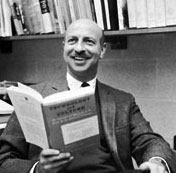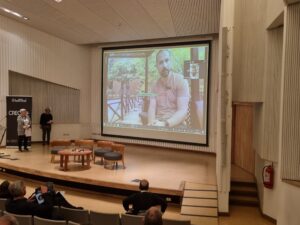

Updated 25 March 2025
It is now possible to submit proposals for the 2025 Kranzberg Fellowship. The deadline for applications is 15 May 2025.
Submit an application for the Kranzeberg Fellowship

Melvin Kranzberg
The Melvin Kranzberg Dissertation Fellowship is presented annually to a doctoral student engaged in the preparation of a dissertation on the history of technology, broadly defined. This award is in memory of the co-founder of the Society and honors Melvin Kranzberg’s many contributions to developing the history of technology as a field of scholarly endeavor and SHOT as a professional organization.
The $4,000 award is unrestricted and may be used in any way that the winner chooses to advance the research and writing of his or her dissertation. Possible uses include underwriting the costs of travel to archival collections; photocopying or microfilming; translation of documents; and so on. The award may not be used for university tuition or fees.
Students from institutions of higher learning anywhere in the world who are working on projects in the history of technology are eligible to apply; doctoral candidates from outside the United States are especially encouraged to submit application materials. Applicants must have completed all requirements for their doctorate except for the dissertation by September 1 of the year the award is made. (Students from outside the United States, whose programs of study may follow a different pattern, are encouraged to contact the committee chair to review their standing and discuss their eligibility for the Kranzberg Fellowship.)
The Kranzberg Fellowship will be announced annually during the Awards Event at the SHOT Annual Meeting.
Link for separate submission of the letter of recommendation
In case you experience any problems with the online submission form please contact the SHOT secretariat.

Yakup Emre Karaşahan, recipient of the 2024 Kranzberg Fellowship during his pre-recorded reply at the Awards Event in Chile. (Photo SHOT)
| Peter S. Collopy, (2022-2024), Chair |
| Mary X. Mitchell, (2022-2024) |
| Michelle Spektor (2024-2026) |
For more information, please contact the SHOT secretariat at [email protected].
| 2024 | Yakup Emre Karaşahan, University of Delaware, “Prophets of a Righteous Civilization: Re-imagining Technology with an Islamic Mindset, 1870-1950.” |
| 2023 | Felipe Trujillo, Pontificia Universidad Católica de Chile Santiago (Chile), “(Green) Revolution among Engineers. Epistemic Communities and Hydric Expertise in Cold War Chile.” |
| 2022 | Alfredo L. Escudero Villanueva, Florida International University, “Surveying the Andes: Indigenous Labor, Land Inspections, and the Technologies of Spanish Colonial Rule” |
| 2021 | Michelle Spektor, MIT, “From Documents to Data: The Emergence of National Biometric Identification Systems in the 20th and 21st Centuries” |
| 2019 | Salem Elzway, “Arms of the State: A History of the Industrial Robot in Postwar America” |
| 2019 | Samaa Elimam, “On Site: Engineering, Empire, and the Geography of the Nile Valley” |
| 2018 | Angélica Agredo Montealegre, “Road Construction and Maintenance in the Developing World: The Cases of Colombia, Argentina, French West Africa and the Algerian Sahara, 1950s-1960s” |
| 2017 | Adewumi Damilola Adebayo, “Electricity, Economy and Society in Southern Nigeria, 1896-1972” |
| 2016 | Nandita Badami, “Harnessing the Sun: Solar Technologies and the Politics of Energy in India, 1870-1990” |
| 2015 | Matthew Hockenberry, “Far Corners of the Earth: A Media History of Logistics, 1865-1969” |
| 2014 | Lisa Zivkovic, “The United States, France, and the Creation of the New Transnational Communications Network Infrastructure, 1960-2000” |
| 2013 | Elizabeth Reddy, “Seismic Politics: The Scientific Development of an Early Alert System Infrastructure in Mexico” |
| 2012 | Felipe Fernandes Cruz, “Flight of the Toucans: Culture and Technology in the Brazilian Airspace” |
| 2011 | Laura Ann Twagira, “Women and Gender in the Office du Niger (Mali): Technology, Environment, and Food, c. 1900-1985” |
| 2010 | Lino Camprubi, “Political Engineering: the History of a Dictatorial State Through Science, Technology, and the Landscape (Spain, 1939-1959)” |
|
2009
|
Bernard Geoghegan, “Theaters of Information: Media, Sites, and Cultures of Postwar Communication Sciences, 1948-1967” |
|
2008
|
Robert C. Gardner, “Growing Trees in the Sand Hills: The Nature and Culture of a Technological Forest” |
| 2007 | Etienne S. Benson, “Spying on the Wild: Science,Surveillance,and Survival in Cold War America” |
| 2006 | Mara Mills, “The Dead Room: Deafness and Modern Communications Technologies” |
| 2005 | Alan D. Meyer, “Why Fly? A Social and Cultural History of Private Aviation in Post-World War II America, 1945-1985” |
| 2004 | Tanya Sheehan, “‘Doctor Photo’: Portrait Photography as Medicine in Late Nineteenth-Century American Culture” |
| 2003 | Matthew Sneddon, “Exhibiting Real America: History and Heritage in Museums of Science, Technology, and Industry” |
| 2002 | Judith Schueler |
| 2001 | Libby J. Freed |
| 2000 | Maril Hazlett |
| 1999 | Gerald Fitzgerald |
| 1998 | Alexander Magoun, “Shaping the Sound of Music: The Evolution of the Phonograph Record” |
| 1997 | Gary L. Frost |